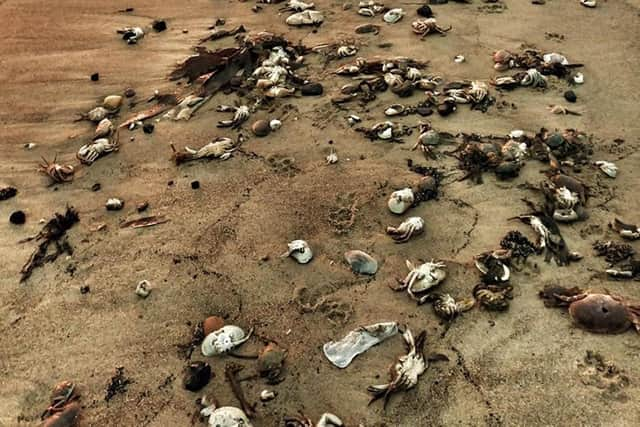Scientists aiming to find out whether chemical killed crabs on Yorkshire coast
Researchers from universities in Newcastle, York and Durham have taken sediment samples from the bed of the River Tees and the seabed around the river mouth.
They are also planning to take samples from sites several miles offshore, where more than 800,000 cubic metres of material dredged from the river as part of the Teesside Freeport is being dumped.
Advertisement
Hide AdAdvertisement
Hide AdIt comes after thousands of dead crabs and lobsters died in mysterious circumstances and began washing ashore between Hartlepool and Whitby in October 2021, but Government-appointed scientists were unable to identify a clear cause.


Marine biologist Joe Redfern said 10 water samples and 20 sediment samples were taken yesterday and they would be analysed for a range of chemicals.
Some of the researchers were involved in an investigation last year that concluded a chemical called pyridine may have killed the crabs and lobsters after being released by dredging.
A panel of Government-appointed experts then completed a review and found an unknown disease or parasite was the most likely cause but “no significant pathogens were identified”, because full molecular screening was conducted by the Department for Environment Food and Rural Affairs (Defra) when the crustaceans were found dead.
Advertisement
Hide AdAdvertisement
Hide AdAccording to the panel, there were three factors that suggest a disease or parasite was the cause: only crustaceans died, they were found across a large area – around 70km of coastline – and some were twitching when they were discovered.
The panel also stated it was “very unlikely” that dredging and toxic chemicals were to blame, claiming no pyridine was detected in the water and the amount of pyridine found in dredged material was not high enough to kill crabs.
It said a range of toxic chemicals, including pyridine, are found in the sediment of the Tees due to “long-term industrial activity” in the area, but they are “measured and reported” during dredging operations.
Pyridine was found in some of the dead crabs, but Defra has previously claimed it can form naturally in crustaceans after death, it did not kill them and “varying amounts” have been found in crabs in other parts of the UK.
Advertisement
Hide AdAdvertisement
Hide AdThe latest research trip is being funded by a group of fishermen, known as the North East Fishing Collective, and donations.
Environment Secretary Therese Coffey has refused calls to launch another investigation into the mass die off, but said the Government will respond to “reports of similar mortality events” by sending experts to take samples for testing.